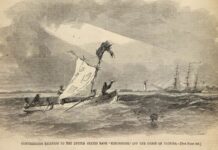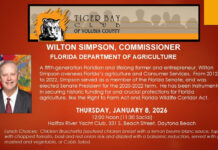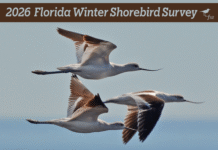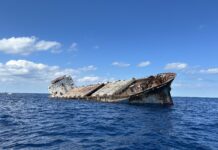Jacksonville, Fla., — As daylight saving time ends on Sunday, Nov. 2, the St. Johns River Water Management District (District) is reminding residents and businesses across the Lower St. Johns River basin, including Baker, Clay, Duval, Nassau, St. Johns, Putnam and Flagler counties, and portions of Volusia, Alachua and Bradford counties, that watering restrictions change to once per week.
With cooler weather and shorter days, lawns and landscapes naturally require less water. Cutting back irrigation this time of year helps conserve the groundwater that supplies our homes and sustains our rivers, lakes and coastal estuaries that define the Lower St. Johns River Basin. From Crescent Lake to the tidal reaches of the St. Johns River, these waters reflect our connection to the aquifer below, the same source that provides our drinking water and sustains the ecosystems that make this region distinct.
“Conserving water is one of the most direct ways we can protect our aquifers, springs and water supplies in North Florida,” said St. Johns River Water Management District Water Conservation Coordinator Kraig McLane. “By following seasonal watering restrictions, we help preserve these vital resources for both people and the environment.”
Public water supply is the District’s largest use, with residents and businesses together using hundreds of millions of gallons of water each day. Outdoor irrigation accounts for much of that demand. Adjusting watering schedules with the seasons helps balance this use, supporting both healthy landscapes and a sustainable water supply.

Once-a-week watering schedule (effective Nov. 2, 2025, through March 8, 2026):
-
Homes with odd-numbered or no addresses: Saturday.
-
Homes with even-numbered addresses: Sunday.
-
Nonresidential properties: Tuesday.
-
Watering hours: Prohibited between 10 a.m. and 4 p.m. to reduce evaporation.
-
Watering time: Limited to one hour per zone.
-
Applies to: All water sources, including wells, surface water, and utilities.
For many newcomers to Florida, it can be surprising to see lawns turn brown during the winter months. However, this seasonal change is normal. Most warm-weather grasses, such as St. Augustine and Bahia, go dormant when temperatures drop. Dormancy doesn’t mean the grass is dead; it’s simply resting until warmer weather returns. Overwatering during this period can waste water and lead to root rot, mold or other lawn health issues.
Additional conservation tips:
-
Calibrate irrigation timers to match the current watering schedule.
-
Inspect sprinkler systems for leaks or misdirected spray.
-
Use a rain sensor or smart irrigation controller to automatically pause watering when it rains.
-
Consider replacing high-volume spray heads with more efficient rotary nozzles.













































